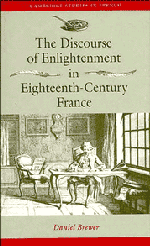Book contents
- Frontmatter
- Contents
- List of illustrations
- Acknowledgments
- Introduction
- 1 Representing knowledge: reading the Encyclopédie
- 2 Enlightenment critique and Diderot's art of philosophizing
- 3 The matter of judgment and the art of phrasing sensation
- 4 Critical narratives: Diderot's Salons
- 5 Embodying knowledge
- 6 Portraying Diderot: the aftermath
- 7 Interpreting Diderot: critical values, critical violence
- Notes
- Index
- Cambridge Studies in French
5 - Embodying knowledge
Published online by Cambridge University Press: 23 November 2009
- Frontmatter
- Contents
- List of illustrations
- Acknowledgments
- Introduction
- 1 Representing knowledge: reading the Encyclopédie
- 2 Enlightenment critique and Diderot's art of philosophizing
- 3 The matter of judgment and the art of phrasing sensation
- 4 Critical narratives: Diderot's Salons
- 5 Embodying knowledge
- 6 Portraying Diderot: the aftermath
- 7 Interpreting Diderot: critical values, critical violence
- Notes
- Index
- Cambridge Studies in French
Summary
Si quelqu'un a aboli la distinction platonicienne-chrétienne entre le haut du corps qui contemple et le bas du corps qui désire, c'est bien Diderot.
Elisabeth de FontenayIn her study of modern scientific discourse, E. F. Keller argues that any discourse of knowledge, including that of science, is libidinally determined. “Without mediation, commonality, or intercourse between subject and object, knowledge is not possible. One of the most common metaphors in Western history for such mediation has been the sexual relation: knowledge is a form of consummation, just as sex is a form of knowledge. Both are propelled by desire.” Moreover, modern scientific knowledge does not reflect upon what drives it as desire. Rather, to found its values, criteria, and practices, it appeals to an “objectivist ideology” designed to preserve the scientist's anonymity, disinterestedness, and impersonality, as well as the neutrality of his or her discourse. But in doing so, it reveals all the more its desire to become a totally “objective” science, possessing an ideal knowledge of objects that would transcend the body and the material in general. Science dreams of an autonomous and objectified subject of science, a subject disconnected from the world of other subjects and from their own subjectivity by the discursive act that represents them as “objects.” In sum, the objectivity of modern scientific knowledge results from its sublimation of a body of desires and its refusal to consider the discourse through which they are channeled.
The Enlightenment's development of techniques for mastering the objects of nature marks one of the beginnings of the scientific modernity Keller analyzes.
- Type
- Chapter
- Information
- The Discourse of Enlightenment in Eighteenth-Century FranceDiderot and the Art of Philosophizing, pp. 168 - 203Publisher: Cambridge University PressPrint publication year: 1993

